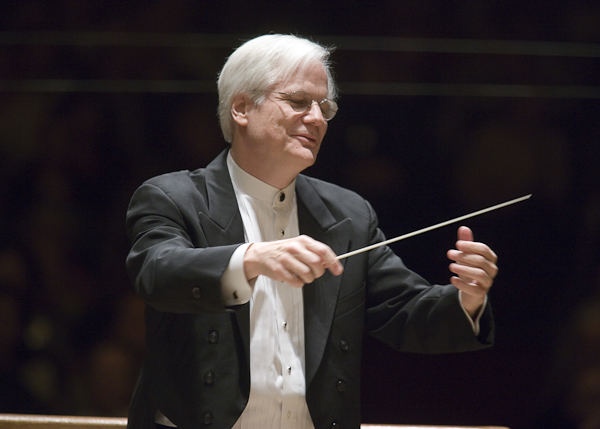Cantata Singers serve up a varied and substantial Christmas program

David Hoose led the Cantata Singers in a Christmas program Friday night in Lexington. File photo: Michael Lutch
Christmas concerts come in all shapes and sizes. But many of them, though light and enjoyable, are filled with hymns, carols, and other holiday favorites that provide more spirit than substance.
That’s not the case with the Cantata Singers. The group’s holiday-themed program, led by David Hoose at Cary Hall in Lexington Friday night, offered robust performances of music by Distler, Lassus, Victoria, Monteverdi, Schütz, and Schoenberg.
Meaty programs such as this are common fare for the ensemble. Recent seasons have featured large-scale works by Bach and Zelenka, and this spring the Cantata Singers will present a rare treat, Honegger’s King David. Like those programs, Friday’s concert offered ancient music as well as modern works that looked back to older styles.
Each piece bore an intimate relationship to its texts. Orlando di Lasso employed fully chromatic harmonies to capture the words of the Sibyls in the opening Sibylla Persica from Prophetiae Sibyllarum, to which the Cantata Singers brought quiet reverence and soft radiance.
The Schoenberg piece heard Friday night, Friede auf Erden, wove silvery lines to set the image and emotional power of the nativity story. Early works of Schoenberg, such as this one, owe much to the sound worlds of Brahms and Mahler. Lines swirl and soar through the music’s bright textures, and the harmony is seductive and wanders into foreign keys. The music is at once rich and alluring. There were a few hesitant attacks, but the choir delivered a performance of swirling intensity, with Hoose drawing singing of palpable energy in the quicker passages of the score.
No composer on the program set text as effectively as Claudio Monteverdi. His Laetatus Sum, one of three of the composer’s settings of the Psalm text, unfolds over a repetitive bass line. Six singers—sopranos Alexandra Whitfield and Lisa Lynch, tenors Daniel Rosensweig and Michael Bennett, and basses Will Prapestis and Mark Andrew Cleveland—spun strands of cascading melody to mix with lines emanating from the small band of instruments. Cellist Rafael Popper-Keizer and organist Heinrich Christensen provided sturdy continuo support.
Monteverdi’s Gloria a 7 is marked for its drama. Melodies of buoyant energy erupt in bright choral statements. Other phrases, such as the “Et in terra pax,” unfold in harmonies of earthy resonance. The “Qui tollis peccata mundi,” sung by tenors Jason Sabol and Stephen Williams and basses Prapestis and Cleveland, was aptly anguished. Through it all, the Cantata Singers delivered singing of precision and intensity to match the power captured in Monteverdi’s score.
Hugo Distler’s writing is difficult for its sparse textures and exposed parts. That’s likely why the opening of his Es ist ein Ros’ entsprungen Variations sounded pitchy and lacking in confidence amongst the singers. The choir took some time to achieve a uniform blend as the phrases of the second movement failed to weave into a plush tapestry. By the third, though, the singers found their groove, supplying soft waves of sound behind alto Jennifer Webb’s silver-laced solo. “Das Blümelein” beamed with warm inner voices, and the concluding chorale glowed with distant warmth.
Tomás Luis de Victoria’s O magnum mysterium, perhaps the composer’s most familiar piece, sounded in a web of luminous lines. Hoose shaped the phrases with subtle dynamics that brought haunting mystery to the work.
Softness of approach also marked Friday’s performance of Heinrich Schütz’s Nun danket alle Gott. A sacred concerto, this work traverses many moods and textures. The soloists sang with energy and graceful musicality, and the choir answered with soft intensity as the lines turned over each other like water over rocks. Schütz’s repetition of “Friede” brought out the piece’s resounding message: Peace on Earth.
Two instrumental works filled out the program. Biber’s ‘The Annunciation” from The Rosary Sonatas spotlighted violinist Danielle Maddon in smooth, free-flowing phrases. The piece’s second movement had dance-like grace. Popper-Keizer and Christensen, with the continuo, supplied solid ground.
Trombonists Michael Tybursky, Robert Hoveland, and Peter Cirelli joined bassoonist Adrian Morejan in a warm rendering of di Lasso’s Sybylla Europaea. The music, with text left unsung, sets the prophesy of the nativity in gentle stacks of chromatic harmony that seem to resonate the profound meaning of the Christmas season.
The program will be repeated 8 p.m. Saturday at St. Paul’s Church in Cambridge. cantatasingers.org
Posted in Performances





Posted Dec 20, 2016 at 7:54 pm by Richard Riley
I attended the dreamlike performance on Saturday nite and was catapulted into a world of mesmerizing euphoria. The Cantata singers under the renowned brilliance of David Hoose make the seemingly ordinary into the extraordinary. Danielle Maddons performance was beyond words and description, a marvel to behold. This groups performance was simply outstanding which doesnt give them the credit they deserve and as fortune would have it, im the passive recipient in the audience. What else can I say, not bad at all.